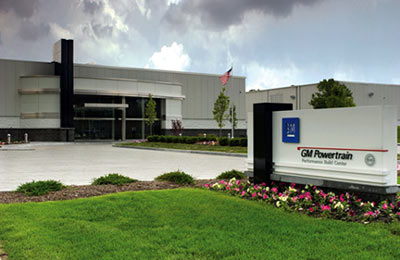MICHIGAN SPOTLIGHT
Looking Both Ways
It was just as important to reach out to Karmann's own network of about 80 Tier II and Tier III suppliers.
"The question was, 'Where do we want to develop our supplier base?' says Olind. "This area is loaded with suppliers, and not just production but the prototype suppliers, who are really key in developing these complicated, next-generation roof systems." While the company may not have enough clout to arrange its own "supplier park" like the OEMs, Olind says "because we're a global company, we leverage a good portion of our supply base, especially those that make key components like the hydraulic units. One is located in the Netherlands, one is in Germany, and they're all moving over here to follow us, just as we followed DaimlerChrysler."
Another advantage of the southeast Michigan location was it made the proposed facility into a light assembly proposition. "We don't need to put in presses, because our production suppliers like Budd and Tower are established here already," says Olind.
 STRICTLY UPGRADE: |
The rooftop systems also are being targeted for mainstream vehicles as well as the high end. It's just one way Karmann would like gain entry into the small ranks of firms that can assemble a complete vehicle.
We're not building complete vehicles in North America ... yet," says Olind with all due intention. "We do it in Europe. This year in Germany we'll build in excess of 100,000 vehicles."
While the company faces six competitors in North America, its niche vehicle assembly competition is a smaller pool: Magna International and ASC. Olind admits to the huge barrier to entry, but says Karmann is up to the challenge.
"There is a tremendous amount of experience and knowledge required," he says. "Karmann has that. There have been requests from the OEMs — 'When are you guys going to come over here and build complete cars?' We're building the Chrysler Crossfire now [in Germany], and we really don't think the next generation will be built in Germany. We think it's going to want to be build here. It's a niche vehicle, and that's where we see an opportunity."
The way the company got that contract speaks well for its future chances. Benefiting from its vertical integration, supply chain network and knowledge base, Karmann was able to assure DaimlerChrysler that it could take the Crossfire from concept to first production in 18 months. "In some cases, we're able to turn a vehicle around faster than the OEMs can do it themselves," says Olind.
And the very reason convertibles can be a challenge for a mainline assembly facility is one of the reasons Karmann likes its chances with total assembly. "We build 20,000 to 30,000 cars annually that don't fit into lean systems of mainline vehicles," says Olind. "That's what drives the need for OEMs to want to have a partner to take those vehicles off their hands."
He hopes the company can extend its working relationship with Nissan from Germany to the U.S., and says the company is "very eager" to do business with Toyota. And he sees the German connection happening in more ways than one. An extensive apprentice program with Hamburg University in Germany involves bringing students over to the U.S. headquarters for 10 weeks,
"These are young talented people, we involve them in projects, they see how things operate, and they come away knowing key people," says Olind. The company is expecting to employ up to 350 people by the time the manufacturing facility reaches a full head of steam. Already, Karmann USA has hired eight engineers from Hamburg U. Forty have studied and work for Karmann Germany, but know the U.S. division.
"They're helping us become global, we're planting the seeds," says Olind
Planting seeds with Germany is exactly what Michigan Gov. Granholm was doing in November 2004. Among the potential German-driven projects in North America is a heavy-duty engine plant from DaimlerChrysler.
Some 610 Michigan companies are German-owned or have at least 50 percent German ownership. German companies contribute an estimated $31 billion to Michigan's economy annually, employing some 172,000 Michigan workers. In addition, the gloomy business climate for expanding operations in Germany is well known. Granholm believes the advanced technology climate that endears Michigan to German carmakers can extend to its other high-tech industries.
She was proven right in December, when Munich-based Infineon Technologies, in addition to announcing a $1-billion auto and industrial chip fab in Malaysia, announced a $5-million expansion that will double that unit's Livonia, Mich.-based technical and engineering support staff to 90.

